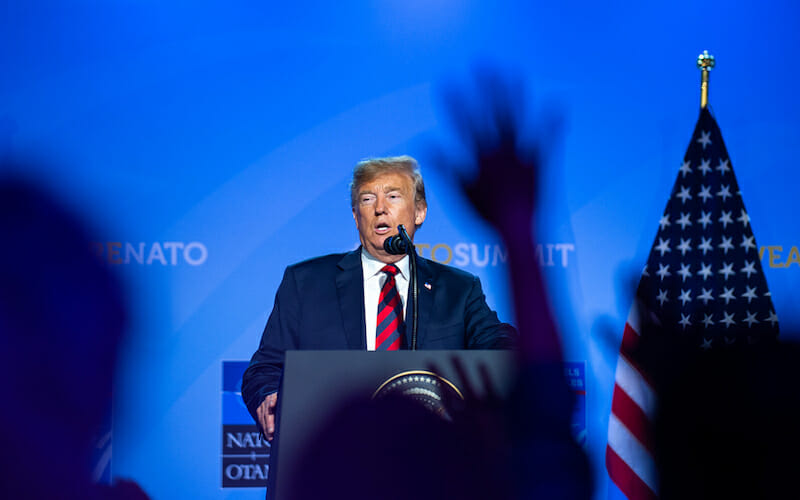
Reordering the Transatlantic Alliance
The NATO Summit in Brussels this past July was not only about the United States haranguing and bad mouthing its Europeans allies, it was also about an attempt to reorder the Transatlantic relationship. Is NATO designed for this purpose? This question has been around since the end of the Cold War, but as continued disagreement over defence spending and burden-sharing has increased, the alliance is appearing increasingly dysfunctional. What is the path forward? In this context, many in Europe and their American friends see President Trump’s new approach towards NATO, not to be an “out of the box” approach. The big takeaway of the NATO Summit is that President Donald Trump has little time for the alliance and a thin appreciation of the track record and historic purpose of an organization that has kept the peace and preserved Western democracies since the end of the Second World War.
President Donald Trump’s trip to Europe in July produced a staggering volume of news. Trump accused Germany of being “a captive of Russia,” and warned NATO allies that the United States “might go it alone” if they didn’t increase spending immediately. Trump accused the British prime minister of “wrecking Brexit,” and met one-on-one with the Russian president, after which he appeared to express more confidence in Vladimir Putin than in his own intelligence services.
“I felt the President treated the NATO allies almost with contempt,” former U.S. Ambassador to NATO Nicholas Burns told CNN’s Erin Burnett after a day in which Trump berated U.S. partners over defense spending and singled out Germany with particular scorn.
White House aides have since worked feverishly, and unconvincingly, to convince the world that Trump didn’t actually mean what he said, or didn’t say what he meant. At the same time, they have introduced new controversies. For example, by suggesting that the United States would consider Putin’s outrageous idea that Russian officials be allowed to interrogate Michael McFaul, the former U.S. ambassador to Russia during the Obama administration, for alleged misdeeds in Russia. The selective and utilitarian America view argues: Would he find it in America’s interests to stand up to a provocation by Moscow, especially if it is against a NATO member he considers has not been paying its way? Any ambivalence about a NATO country’s fate is critical, since the entire credibility of the grouping rests on the certainty that an attack on one is an attack on all.
In an interview that President Trump gave to the Fox News host Tucker Carlson, Mr. Trump appeared to suggest that the NATO mutual defense compact is confusing, particularly the question of why America would have to defend a small country like Montenegro, which is thousands of miles away.
Mr. Trump has long raised questions about the future of the United States’ commitment to NATO, a defense treaty that was established to stave off aggression from what was then the Soviet Union. Montenegro joined the alliance in 2017, a year after Russia plotted a coup to overthrow Montenegro’s government and replace it with one that would be hostile toward NATO.
“Alliance trust is gained in drops and lost in buckets,” tweeted Mark Hertling, a former U.S. Army commander in Europe. Article 5 of the NATO charter says “the Parties agree that an armed attack against one or more of them in Europe or North America shall be considered an attack against them all,” and that they agree to “assist the Party or Parties so attacked.”
Stunning. The “provisions” are what makes it a mutual security and defense alliance. Alliance trust is gained in drops and lost in buckets. https://t.co/GFDyblqsuI
— Mark Hertling (@MarkHertling) July 18, 2018
Yet there is another aspect to the recently held NATO Summit. Yes, Trump has signed up to NATO, but he views the alliance much like the EU: a multilateral organization that in his view takes advantage of the United States. NATO may have disabused him of that notion by the promise to spend more. But he will be certain not to let them off the hook.
It is a truism that President Trump has personally criticized Europe, and particularly the European Union which is pivotal to his foreign policy. Europe is the poster child for his thesis that America has been taken advantage of for the past 30 years and that it has been shelling out money for its allies’ security while they have been free-riding on America’s generosity. In Trump’s eyes, the fact that countries like Germany are running a trade surplus in goods with America means they are taking advantage of America and NATO is therefore worthless.
And yet, the Europeans could also argue that America’s high spending on defence hasn’t exactly helped. The Iraq war involved a huge cost in American blood and treasure, but Iraq is seen by many, including President Trump, as a huge mistake. Do Europeans need to contribute more to their own deterrence and defence? Undoubtedly. On the other hand, spending on development assistance and security training in the Sahel is as important to European and Transatlantic security as buying more sophisticated air defence systems.
In apparently rejecting traditional U.S. reverence for the Transatlantic alliance, Trump is departing from the views of many senior members of his own administration and military establishment. In a preemptive strike, 97 U.S. Senators voted to support NATO, and the other 28 members of the alliance. Veritably, with the end of the Cold War era, the core of the collective security doctrine seems under fire since transnationalism, the force of weaving expediency seems to redefine the future scope of this historic alliance between the United States and Europe. The principle of collective defense is at the very heart of NATO’s founding treaty. Collective defence means that an attack against one Ally is considered as an attack against all Allies.
The principle of collective defense is enshrined in Article 5 of the Washington Treaty. But seen factually, in its whole history of seven decades the Transatlantic community has only once exercised this doctrine of collective defense after the 9/11 attacks. The unified sprit of Article 5 is now experiencing the loose bonds in this so called interwoven defense pact because of the growing security gulf between Brussels and Washington. Trump’s security barganing with the European allies serves ample evidence to this thesis.

